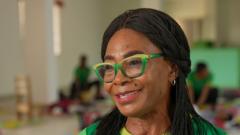In Nigeria, the struggle against cerebral palsy is marked by personal dedication and societal challenges. Nonye Nweke, a single mother, founded the Cerebral Palsy Centre in Lagos after grappling with finding support for her daughter, Zimuzo. Zimuzo, 17, was adopted by Nweke from an orphanage and was diagnosed with cerebral palsy shortly after she was taken home. With limited support and understanding, Nweke felt compelled to create a nurturing environment for her daughter and other children facing similar challenges.
Living with cerebral palsy is a lifelong commitment to care. The Cerebral Palsy Centre currently provides assistance for 12 children, many unable to speak or walk, while waiting for treatment due to the lengthy queue of over 100 applications. In Nigeria, cerebral palsy is often a consequence of untreated neonatal jaundice, a condition affecting about 60% of newborns due to a build-up of bilirubin in the blood. While treatment is accessible in other countries, it remains scarce in Nigeria, exacerbating the already dire situation of neurological disorders.
According to medical professionals, immediate treatment for jaundice is critical within the first 10 days of life to avoid severe repercussions, including brain damage resulting in conditions like cerebral palsy. Unfortunately, the limited three privately-run cerebral palsy centres across Nigeria further highlight the inadequacy of resources for the population of over 200 million.
Nweke notes the emotional and financial burdens of caring for children with disabilities, feeling isolated from other mothers who do not share her experience. The cost of care at the centre is often unbearable, as it requires about $1,000 a month, contrasting starkly with the country's national minimum wage of approximately $540 annually.
Stigma also plays a significant role in the challenges faced by families. Some communities in rural Nigeria contest the beliefs surrounding congenital disorders, labeling affected children as "witches," which leads to neglect and abandonment.
However, hope is on the horizon. The Oscar Project is a new initiative aiming to reform neonatal jaundice treatment and awareness in Lagos, inspired by disability advocate Oscar Anderson. The project focuses on equipping healthcare facilities with necessary equipment and training healthcare workers while seeking to educate mothers about the dangers of untreated jaundice.
Anderson, who battles cerebral palsy due to untreated jaundice, emphasizes the urgency of preventive measures and accessible screening. His ambition is for every newborn to undergo jaundice screening, thus drastically reducing the incidence of cerebral palsy in the country.
Despite the overwhelming setbacks in Nigeria surrounding awareness and resource allocation, efforts like those of Nweke and the Oscar Project demonstrate the resilience and commitment needed to advocate for improved healthcare strategies and reduced stigma surrounding disabilities.



















